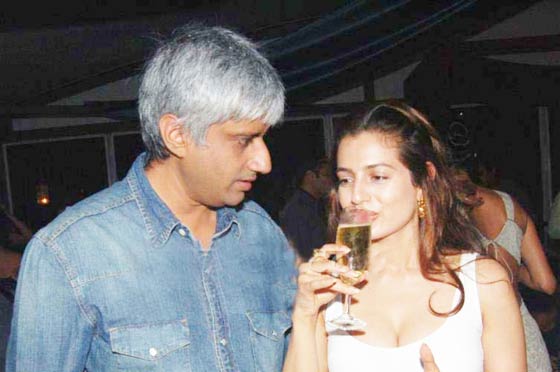He had a rocky start in Bollywood and faced upheavals in his personal life but earned fame with films like “Ghulam”, “Raaz” and “1920”. Filmmaker Vikram Bhatt says life in the spotlight comes at a price — and he has paid heavily.
“My life in the spotlight has cost me a lot,” Bhatt told IANS in an interview on the phone from Mumbai.
“I have paid for things that I had done because I have been in the spotlight. You know, nothing comes free. If you want to chase fame, then fame has a price. You can’t get convenient fame.
“You can’t say, ‘Hey! I want only the good things and for the bad things I do, look away’. So, if you crave for the spotlight, you pay for the spotlight,” added the filmmaker, whose latest web series “Spotlight 2” on Viu is about the rise and fall of a star singer.
Bhatt was happily married to his childhood sweetheart Aditi — with whom he has daughter Krishna — when an affair with former Miss Universe Sushmita Sen came along and became a marriage-breaker. But it was a short-lived romance, after which he dated “Kaho Naa… Pyaar Hai” actress Ameesha Patel.
“It’s all on Google,” he said, reflecting on what the spotlight has cost him.
Contemplation now comes easily to Bhatt.
“We have got so caught up in an insular world that swings between our phones, our computers and our heads that we have forgotten to look out of the window, and say, ‘Hey! It’s raining’,” said the filmmaker, who finds this obsession with virtual world cringe-worthy.
“The things that used to make me happy have stopped making me happy, because I don’t live in that world any more. One must live in that (real) world,” he added, pointing out how “people call less and WhatsApp more… People have gotten connected to move away”.
“How ironical is that,” he exclaimed.
Steering the conversation to how technology has changed the consumption pattern of entertainment junkies in India, Bhatt was reminded of the time he broke new ground with the web series “Maaya”, which was pitched as the first Indian fictional work on BDSM (bondage, discipline, sadism and masochism).
“When I started ‘Maaya’, people didn’t even want to do web series. But now most of them call me and say, ‘Let’s do something’. It’s a good thing. It’s the future.”
Does he find the platform more liberating as it comes without the limitations of censorship?
“Well, there is self-censorship. It’s not that just because there’s no censorship on the platform, we will have frontal nudity and all of that. As a matter of fact, let me tell you that the audience itself censors what they see on the phone.
“Everything is WiFi and data connected. If I want to see porn, I’ll see porn. I am not going to see a web series because it has some kind of titillation. People are becoming very discerning. If they want to see a show for a story, they will see the show. If they want to see sex, they will see sex. If they want to see comedy, they will see comedy. It’s become very clear cut,” Bhatt said.
The key, he says, lies in engaging audience interest.
“The only way you can captivate an audience is by your content, unlike a film where once you have bought a ticket, you are a captive audience even if the movie is an average entertainer. Here (in a web series), it’s different because even if you have one minute of boredom, people will switch off and go somewhere else.”
With platforms like Netflix and Amazon Prime Video establishing their presence in India and announcing shows with film stars, is the “star” factor going to give a fillip to the medium?
“I think the stars will give you the first 1.5 or 2 minutes of attention from the audience; after that, if the story doesn’t grab their attention, then you can kiss your content goodbye.”
Doesn’t that make things tougher?
“It’s becoming easier… All we need to do is work on our stories. How easy is that? We don’t need to tolerate stars and their make-up vans and make-up mans… We don’t need to go down that road… What’s easier?”
by Radhika Bhirani

